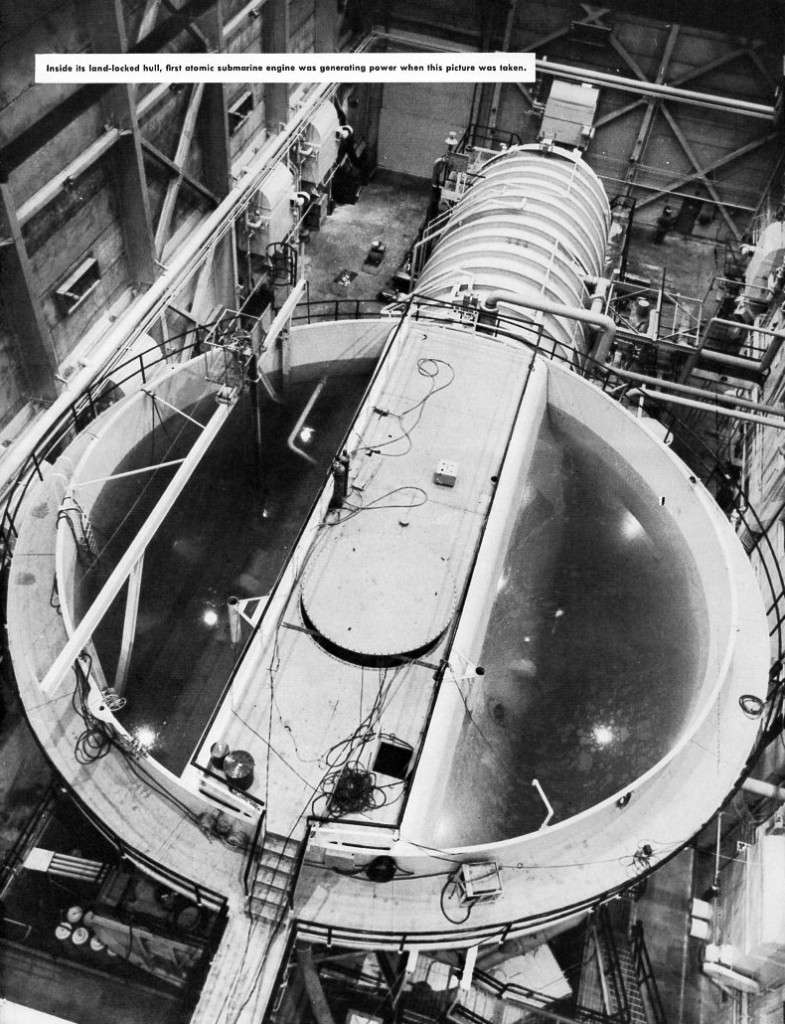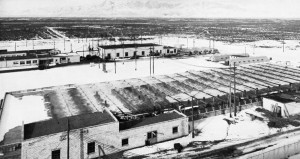They Harnessed the ATOM - the first Navy prototype nuclear plant
This past week, a remarkable article was printed in The Atlantic, which gave a full first-person account of the initial trial run of the STR Mark I nuclear prototype plant-the plant that paved the way for the success of the first nuclear powered vessel ever built, the submarine USS NAUTILUS.
At the time this prototype plant was built in the Idaho desert, at what was at that time called the National Reactor Testing Station (NRTS), there was actually a rather remarkable amount of information provided to the public about the plant-mostly in terms of photographs of the plant, if not anything in any real technical detail. Let's take a look at some of the unclassified views released to the public and published in widely available resources, along with a few details of the plant's history.
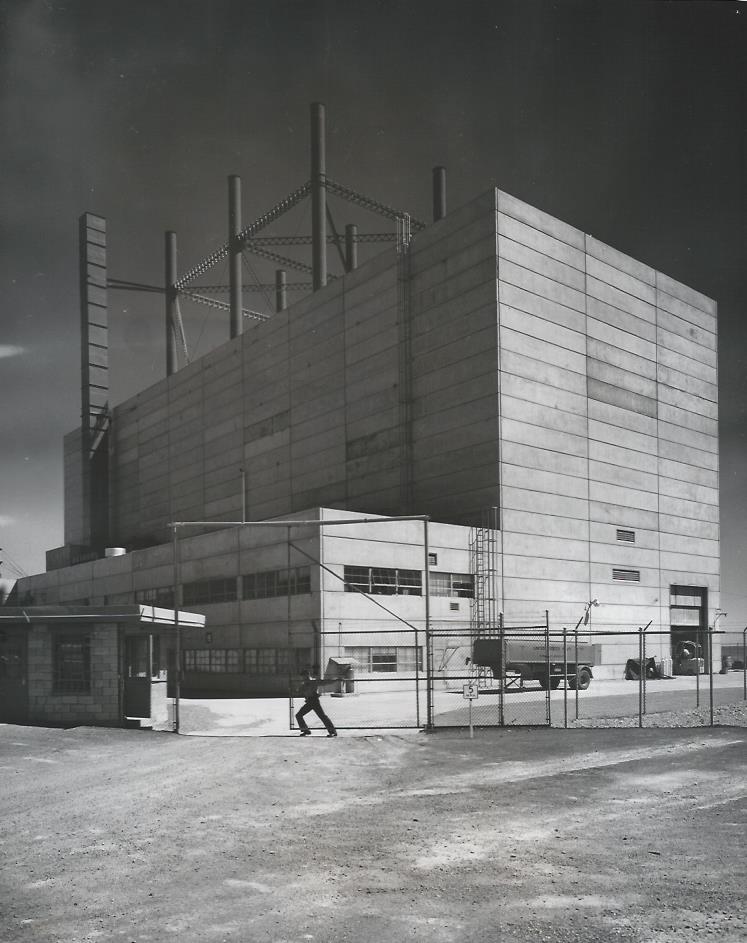
The photograph above was released January 20, 1954, and was both distributed by wire photo channels (you are seeing a scan of an original photo) and was published in a remarkable PR brochure entitled "They Harnessed the ATOM," which you'll see more of shortly. This is the STR Mark I prototype at NRTS Idaho Falls; "STR" stood for "Submarine Thermal Reactor," the original designation for this plant that was later redesignated "S1W" for "Submarine, First design, Westinghouse." At the time this plant was constructed, its designer, the Bettis Atomic Power Laboratory, was operated by Westinghouse for the U.S. government-hence the "W" designation. This of course is the plant whose operation was detailed in the article linked above.
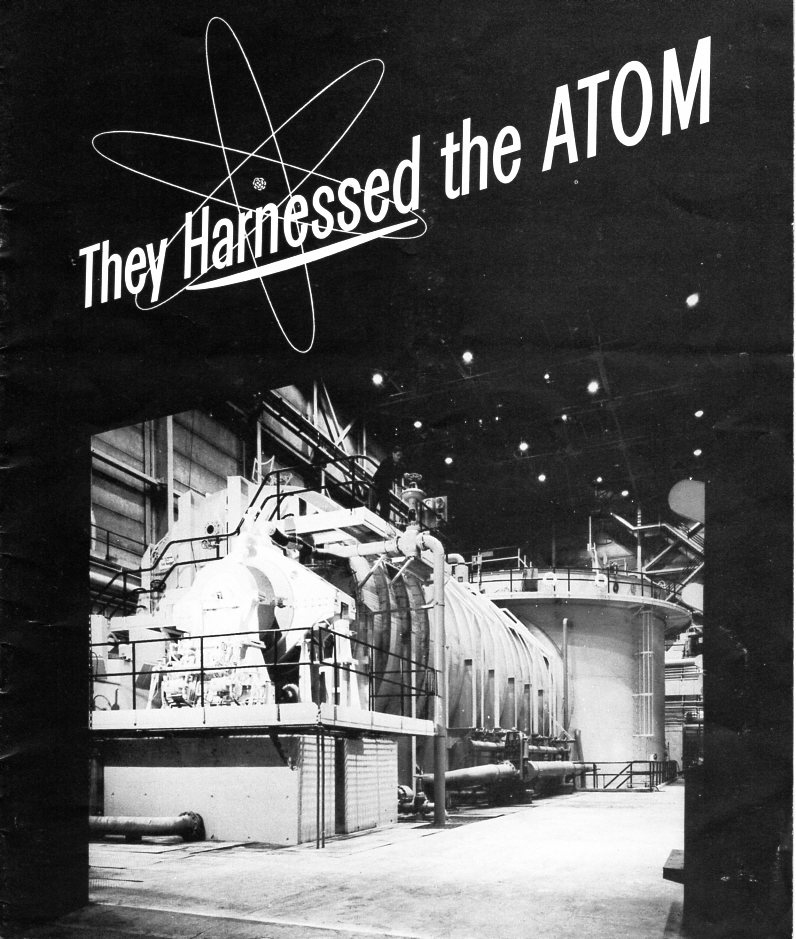
Above, the front cover of the brochure "They Harnessed the ATOM" that shows a view into the open door of the STR Mark I prototype. The simulated submarine hull is clearly visible, as is the large tank of water at the opposite end that surrounded the reactor compartment and that was used for shielding.
Inside "They Harnessed the ATOM" is this view (above) looking down onto the STR Mark I prototype power plant. The power plant of course developed a fair amount of waste heat, which had to be dissipated; in these early days, cooling towers were not used but rather spray ponds. The spray pond for STR Mark I is seen below, also from this brochure. The pond, it was said, held 2 million gallons of water and could cool 22 500 gallons of water per minute.
Another publication of that time that featured photos and some scant details on the construction of this prototype was "Selected Articles on Nuclear Power," which took several articles that had appeared in the Westinghouse employee magazine "The Westinghouse Engineer" and republished them essentially as an advertising brochure-although this one was much more pointed at industry than the previous one shown, which was pointed at the general public. Inside the front cover of "Selected Articles," we find the illustration seen below.
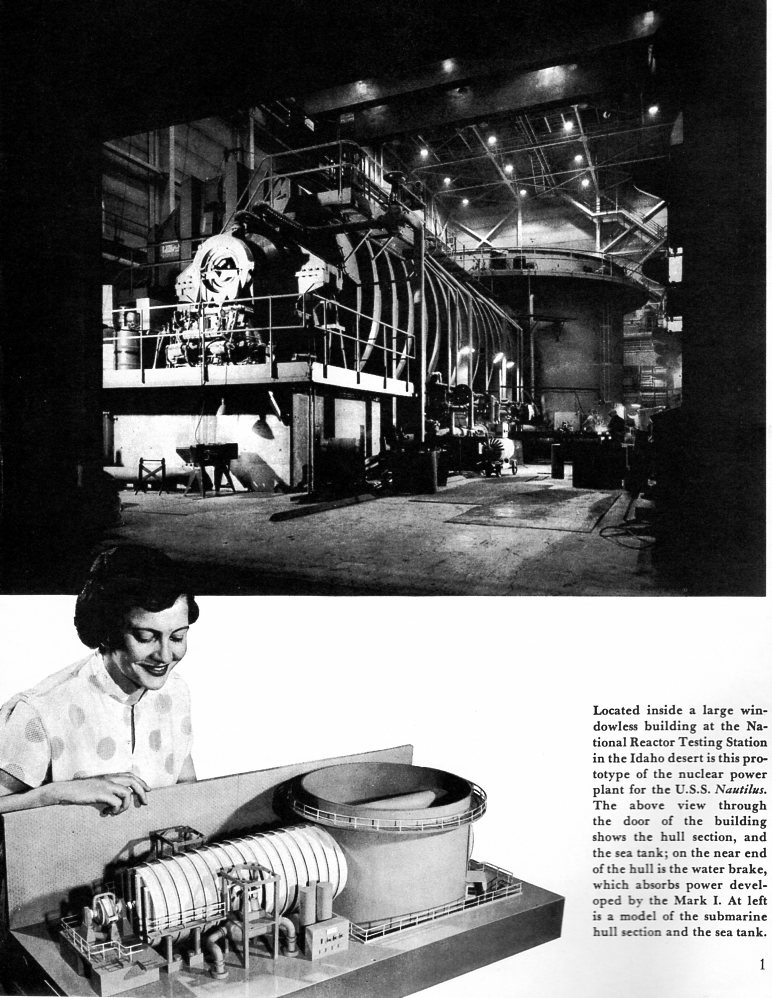
The upper part of the illustration is a view similar to, but not identical with, that seen earlier while the lower appears to show a student examining a model of the power plant. Naturally, the model is an exterior model only (not a cutaway) and shows no real details of the nature of the construction of the nuclear steam supply system, propulsion or control equipment, or actual plant arrangement.
Inside this publication is an interesting and concise timeline of use to historians:
Timetable of Submarine Thermal Reactor Project
• April 1948 - Formal project established at Argonne National Laboratory
• June 1948 - Original Navy-Westinghouse contract
• December 1948 - Original AEC-Westinghouse contract
• March 1950 - Occupancy of new facilities at Bettis Site
• August 1950 - Commencement of STR Mark I construction, National Reactor Testing Station, Idaho
• August 1951 - Award of NAUTILUS construction contract to Electric Boat Division, General Dynamics Corporation
• June 1952 - Keel plate laying of USS NAUTILUS (SSN-571)
• March 1953 - First critical operation of STR Mark I prototype plant
• January 1954 - Launching of USS NAUTILUS
• September 1954 - Commissioning of USS NAUTILUS
As can be seen from the timetable above, time was of the essence for the prototype power plant, as the keel for the operational submarine (which would house the plant designated STR Mark II) had already been laid down less than a year before the first startup of the prototype reactor. As is so vividly described in the Atlantic account, the actual prototype's design was already well up the learning curve and the performance so satisfactory that NAUTILUS went to sea confident in its ability to perform. Of course, Admiral Rickover's choice to build the first prototype plant as a simulated, land-locked submarine section in order to prove out not just concept but physical construction was exactly correct. A similar design process-use of an actual power plant design that could be duplicated perfectly for a production submarine-was employed for the Submarine Intermediate Reactor Mark I, built thousands of miles away to test principles for what would become USS SEAWOLF at the same time.
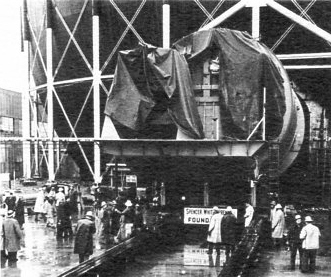
From the brochure "The Seawolf Story," Knolls Atomic Power Laboratory. "In the early morning of March 20, 1954, the prototype power plant of the Seawolf was 'launched' into its location in the 225 ft. diameter steel sphere located at the West Milton Site of the Knolls Atomic Power Laboratory."
What happened to STR Mark I, later known as S1W? The plant operated for decades, as an integral part of Admiral Rickover's system that insisted that Navy nuclear propulsion personnel obtain qualification on a land-based plant before being assigned to a nuclear powered ship or submarine. The plant finally shut down for the last time in October 1989.
It may be difficult to imagine today that photos such as we have seen were released, but several of these have actually circulated fairly widely. In fact, it would certainly appear that India took notice of the design of these early submarine prototype plants; look at the links below, and note the overall, external design of the prototype plant for the first Indian nuclear submarines.
"INS Arihant reactor to be made critical next week" (May 2013)
INS Arihant reactor goes critical (August 2013)
(Note: The article above is no longer available from the source, therefore the link has been disabled.)
In a First for India, Nuclear Sub's Reactor Activated (August 2013)
Were it not for the fact that the above-linked articles' photos are color, one might assume the view was of the STR Mark I prototype in 1954 and not of an Indian nuclear sub prototype in 2013.
For more information:
"Nuclear Navy celebrates end of an era at Idaho Falls." Article at INL.GOV website about the shutdown of the last operating Navy nuclear prototype at the former NRTS Naval Reactors Facility.
Photos and brochures used in this article are in Will Davis's library.
_____________________________
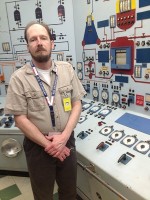 Will Davis is the Communications Director for the N/S Savannah Association, Inc. where he also serves as historian, newsletter editor and member of the board of directors. Davis has recently been engaged by the Global America Business Institute as a consultant. He is also a consultant to, and writer for, the American Nuclear Society; an active ANS member, he is serving on the ANS Communications Committee 2013-2016. In addition, he is a contributing author for Fuel Cycle Week, and writes his own popular blog Atomic Power Review. Davis is a former US Navy reactor operator, qualified on S8G and S5W plants. Davis is temporarily managing all social media for the American Nuclear Society.
Will Davis is the Communications Director for the N/S Savannah Association, Inc. where he also serves as historian, newsletter editor and member of the board of directors. Davis has recently been engaged by the Global America Business Institute as a consultant. He is also a consultant to, and writer for, the American Nuclear Society; an active ANS member, he is serving on the ANS Communications Committee 2013-2016. In addition, he is a contributing author for Fuel Cycle Week, and writes his own popular blog Atomic Power Review. Davis is a former US Navy reactor operator, qualified on S8G and S5W plants. Davis is temporarily managing all social media for the American Nuclear Society.


